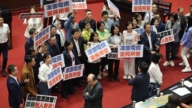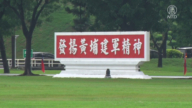【新唐人2014年12月05日訊】台灣執政的國民黨在日前的「九合一」地方選舉中慘敗,有外媒指出,台灣這次選舉其實是一次有關兩岸關係的全民公投,人民利用選票懲罰了親中共的國民黨。
國民黨在11月29號的選舉中大崩盤,在22個縣市長席位中,它只取得6席,連那些被它視為穩操勝券的城市,如新竹、桃園,也從它的手指尖溜走。國民黨因此被不少台灣民眾,包括媒體,戲稱為「從台灣頭輸到台灣尾」。
國民黨為甚麼落到這種田地呢?美國CNN報導說,失敗有各種各樣的理由。在許多選區,國民黨情願花更多時間攻擊對手,而不是試圖讓選民相信,它提名的候選人很優秀。更重要的是,馬英九和他的政黨由於親共,變得高度不受歡迎。
時事評論員藍述:「對共產黨的唾棄,不僅僅是台灣,它是一個歷史的潮流,前蘇聯還有前東歐社會主義國家政權都已經倒臺了。這一次台灣反映出來的,實際上是在這個大的歷史背景之下,集中體現在台灣這麼一個區域性的現象,主要是民眾對國民黨與共產黨之間走的太近表示不滿,表現了台灣的民眾對中共的不信任。」
CNN的報導指出,馬英九執政期間,試圖透過與中共簽署兩岸協議,來重振台灣經濟,以實現他的競選諾言,但是,這個諾言從來沒有實現。因為,跟中共增加貿易的好處,往往掉進大亨的口袋,而對於大多數台灣人,特別是年輕人,他們的前景依然黯淡無光。
報導還說,3月份爆發的「太陽花運動」提升了人們對「中共黑手」的認知。台灣人越來越意識到馬政府這樣做的政治風險,許多人指責馬英九不夠重視保衛台灣的主權和民主。因此,公民社會和許多被它激勵的人,在這次選舉中,懲罰了國民黨。
藍述:「中共過去一直通過向台灣讓利這種辦法,收買台灣政壇的一部分政客,主要是收買國民黨這些官員,這麼幾十年走下來,台灣社會已經逐漸認識到,來自於北京的讓利,實際上最後的結果是威脅到台灣社會的未來。特別這一次香港的佔中運動的發展,讓台灣民眾徹底覺醒,所以這一次向國民黨發出一個非常清晰的信號,如果繼續採取與中共妥協的政策,國民黨將很難再翻身。」
《中央社》引述法國《費加羅報》(Le Figaro)也指出,台灣民眾用選票懲罰國民黨的親中政策。報導說,中國大陸是台灣的第一大貿易夥伴,但從來沒有放棄以武力統一台灣,讓珍惜民主的台灣人擔心,與中國大陸的協商,會導致台灣被併吞。
《法國世界報》則援引一位法國學者的話說,馬英九體制繞過民主機制,和中共達成協議,而且讓警察和司法為政治服務,這些都在這次選舉中受到了懲罰。
《紐約時報》指出,國民黨在2016年的總統大選中,將很難保住執政地位。報導說,選民的態度,體現了對政府與北京關係過於密切的一個反彈。
台灣中央研究院的中國政治研究員徐斯儉向《紐約時報》表示,這是選民向國民黨發出的一個強烈信號,也是對北京的信號,尤其在香港佔中運動之後,台灣選民變得更加警覺。
中國反政治迫害同盟主席劉因全:「這樣(親中)的結果必然是把台灣拱手送給共產黨,就是所謂的一國兩制。 一國兩制是個騙局,特別是香港,現在香港人看透了,就搞佔中。台灣人民覺醒了,他們看到了危險,所以他們用選票唾棄國民黨。國民黨這一次是慘敗,而且這一敗不可收拾,我預言,國民黨執政已經一去不復返了。」
英國廣播公司《BBC》報導說,台灣這次選舉被普遍看作是一次就兩岸關係問題舉行的全民公投。一些選民擔心,如果繼續允許執政的國民黨與中共建立強而有力的聯繫,台灣將在經濟上過於依賴中國大陸,從而有朝一日無力抵抗中共施加的統一壓力。
採訪/朱智善 編輯/陳潔 後製/蕭宇
Foreign Media: Taiwanese Punish Pro-Communist Party
The recent fiasco during elections of Taiwan’s governing
party Kuomintang (KMT), drew wide speculation
from international media.
Some believed the 2014 local elections were widely seen as a
referendum on relations with China.
People punished the KMT which has been pro-Communist
in recent years with their votes.
During the elections on Nov.29, KMT crashed pitifully.
Among 22 constituencies in the mayoral and commissioner
elections, KMT had won only six of them.
Even cities such as Hsinchu and Taoyuan considered secure,
slipped through their fingers.
The Taiwanese dubbed KMT as being totally defeated
from the north to the south.
A special report of CNN indicated, there are sundry reasons
for the defeat.
In many constituencies, the KMT spent more time attacking
its opponents than trying to convince voters of the virtues
of its own candidates.
More importantly, Ma and his party have become highly
unpopular, after six years of rapprochement with Beijing.
Commentator Lan Su: “It is not just in Taiwan, the disgust
against the Communist Party is a historical trend,
such as the demise of former Soviet Union and the former socialist
countries of Eastern Europe.
Taiwan has demonstrated a regional phenomenon
under this historical background.
People are displeased with the close ties of the KMT and CCP.
It shows the distrust of Taiwanese people towards the CCP."
CNN’s report also said, the signing of cross-strait agreements,
the promised “revival" of Taiwan’s stagnating economy never
materialized.
Because the benefits of increasing trade with China tended
to fall in the lap of magnates,
while for the majority of Taiwanese — especially youth –
the prospects for their future seemed grim.
The report also analyzed, the Sunflower Movement raised
awareness about the “black hand" of China.
Many faulted Ma Ying-jeou for not paying enough attention
to safeguarding the island’s sovereignty and democracy
in the process.
There is no doubt that civil society, and the many that
it inspired, punished the KMT in the elections.
Lan Su: “It has been common practice for CCP to deceive
some of Taiwans politicians through its claim
of profits transfer to Taiwan.
After decades of experience, Taiwanese society has gradually
realized Beijing’s profit transfer will only threaten
the future of Taiwan.
The Hong Kong Occupy Central Movement has particularly
awoken the people of Taiwan.
This time, it is a very clear signal to the KMT, any further
compromising of policy with the CCP, will leave KMT
no chance of combat."
The Spanish newspaper 『El País’ also reported that Taiwan voters
are punishing it’s government’s approach to China.
Being number one trade in Taiwan, Beijing has never
renounced the possible use of force to reunify Taiwan.
The setback of the close ties with China is the fear
of excessive reliance to China and the annexation of Taiwan.
The French Daily El Monde then quoted a French researcher ,
stating that Ma Ying-jeou’s KMT has claimed a monopoly
of relations between the two sides,
free of any consultation with civil society and other parties,
and systematically turning to the courts, the police force
are in service of its political agenda.
Thus the punishment is due in the elections.
New York Times pointed out, the election results…signal
that KMT will be hard-pressed to retain the presidency
in the 2016 election.
The Kuomintang’s losses also suggest that Taiwan voters may
be turning against party efforts to forge closer ties with China.
Hsu Szu-chien, a scholar of Chinese politics at Academia Sinica,
a state-financed research institution in Taipei told N.Y. Times,
the result is a very strong signal not only to the KMT,
but a signal to Beijing, too.
He said, “Particularly after the Occupy Central movement,
I think the Taiwanese voters are alarmed by the relationship
between Beijing and Hong Kong.”
Anti-Political-Persecution Alliance of China Chairman
Liu Yinquan: “The result (pro-Beijing) will surely lead to giving
up Taiwan to CCP, the so-called one country, two systems.
The “one-country, two systems” is a hoax.
Hong Kong, in particular, has seen it clearly.
That’s why there is the Occupy Central.
Taiwanese people are awakened to it. They saw the danger.
They show their disgust in the KMT with their votes.
The KMT has totally failed this time.
I think the KMT’s ruling is gone.
BBC reported that the Taiwanese polls were widely seen
as a referendum on relations with China.
There are worries that closer ties with China will ultimately
hurt Taiwan’s independence –
by making the island too economically dependent on its neighbour
and vulnerable to pressures to reunify.
Interview/Zhu Zisan Edit/Chen Jie Post-Production/Xiao Yu




























